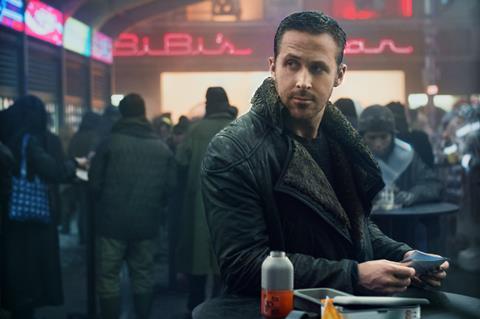
Denis Villeneuve’s visually impressive Blade Runner: 2049 has garnered plenty of critical acclaim. However, much like Ridley Scott’s now iconic original, the film has underwhelmed at the box office in comparison to its $150m-plus budget.
Count Michael Deeley, producer of the 1982 classic, among the film’s sceptics – even before seeing it. “I’m not looking forward to seeing it,” the Oscar-winning producer told Screen. “But I will.”
Deeley, also known for producing classics The Deer Hunter, The Italian Job and The Man Who Fell To Earth, is among those to point out that the film’s 164-minute run time potentially hindered its box office. ”The picture is very long. It must have been cut-able and should have been. They can’t do better [box office] because they can’t play it more than three times a day because it’s just too long, which is of course self-indulgent at the very least, arrogant probably. It’s criminal.”
The sci-fi, which Warner Bros released domestically and Sony Pictures is handling internationally (the latter also co-financed with Alcon), cost an estimated $150m-$180m. Thus far, it has grossed $223m globally (including $81m in the US).
Outside of the US, its most successful territory is the UK, where takings are up to $21m. The film opened on October 27 in Japan and is due for release in China on November 10, with the two Asian markets key to its final gross and overall success.
Challenges on the original
According to Deeley, who was speaking to Screen to promote a new edition of his memoir Blade Runners, Deer Hunters And Blowing The Bloody Doors Off, the producer owned the remake and sequel rights to the original film for ten years but decided against doing so in part because of its mixed critical reception, underwhelming box office and his challenging relationship with executive producers Bud Yorkin and Jerry Perenchio.
“The film didn’t catch fire for ten years so I couldn’t have made a remake or another version of it and I wouldn’t have wanted to anyway.”
“It was all very sticky,” he said of the production process, which saw original financier Filmways drop out after the film’s budget ballooned.
The film’s release wasn’t much easier. “One of the things that spelt doom straight away was when Perenchio decided that he wanted to release the picture quickly to get his money back quickly,” says Deeley. “That was ignorant and naive. The only time this picture could ever be released sensibly was in the late autumn or in the winter when you could have capitalised on award nominations.”
“Instead, they decided to do it in summer, opposite another little known sci-fi movie – a picture called ET. I wouldn’t talk to Bud Yorkin or Perenchio or have anything to do with them for the rest of my life.”
Thankfully for all involved, the film went on to become one of the seminal sci-fi movies of all time. Its longevity is partly down to its originality, says the producer. “Its look is a completely fresh look,” he posits. “It also made three interesting prophecies: the widespread deterioration of weather; huge changes in migration; and the ability to clone human beings. Added to which it was the last film of that sort made without CGI. I can see CGI, and I suspect a lot of other people can as well.”
The Deer Hunter
The industry veteran, now 85, found himself at loggerheads with the director, rather than producers, of one of his other classics. The Deer Hunter, which will celebrate its 40th anniversary next year, was another challenging picture to make with Deeley among those to struggle with the behaviour of maverick filmmaker Michael Cimino.
“He got into a pickle when he tried to take all the credit for the script himself,” says Deeley. “That was the beginning of the feeling that this was not going to be an honest relationship between the director and the company. And it wasn’t. He always wanted to do things which were not in his deal.”
In his memoir, Deeley claimed that the late Cimino was reluctant to include the film’s Viet Cong Russian roulette scene. The scene owed much to star Robert De Niro, the producer told Screen. “That was [Robert] De Niro who did the choreography of that scene.”
And it was De Niro who provided much of the glue during production, according to Deeley, who at the time had his hands full also trying to finish Sam Peckinpah’s Convoy. “De Niro was very involved from before we started shooting. He was the rallying point of the whole crew and he rehearsed by himself with the actors he knew who were mostly suggested by him.”
Despite its five Oscars and widespread critical acclaim, the tough-to-please Deeley claims the 1978 classic under-delivered. “The fact that Cimino came out of it with a very nice picture, a good picture, doesn’t mean it couldn’t have been better.”






![The Brightest SunScreen[Courtesy HKIFF]](https://d1nslcd7m2225b.cloudfront.net/Pictures/274x183/3/5/0/1448350_thebrightestsunscreencourtesyhkiff_312678.jpg)


















No comments yet